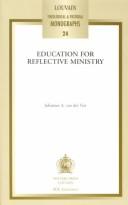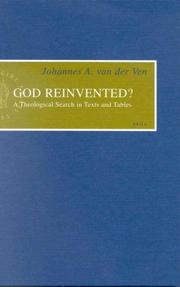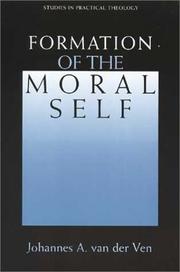| Listing 1 - 10 of 12 | << page >> |
Sort by
|
Book
ISBN: 9042905670 9789042905672 Year: 1998 Publisher: Leuven: Peeters,
Abstract | Keywords | Export | Availability | Bookmark
 Loading...
Loading...Choose an application
- Reference Manager
- EndNote
- RefWorks (Direct export to RefWorks)

ISBN: 9042906723 9789042906723 Year: 1998 Volume: 24 Publisher: Louvain: Peeters,
Abstract | Keywords | Export | Availability | Bookmark
 Loading...
Loading...Choose an application
- Reference Manager
- EndNote
- RefWorks (Direct export to RefWorks)
Pastoraal --- Pastorale --- Pastoral theology --- Study and teaching --- 254 --- #gsdb6 --- Priester. Ambt:--algemeen --- Clergy --- Training of --- Care of souls --- Cure of souls --- Ministry --- Pastoral office and work --- Theology, Pastoral --- Church work --- Pastoral care --- Pastoral theology - Study and teaching

ISBN: 9004113304 9789004113305 9004665641 Year: 1998 Volume: 1 Publisher: Leiden: Brill,
Abstract | Keywords | Export | Availability | Bookmark
 Loading...
Loading...Choose an application
- Reference Manager
- EndNote
- RefWorks (Direct export to RefWorks)
Religion --- 231 --- Religion, Primitive --- Atheism --- God --- Irreligion --- Religions --- Theology --- God. De Deo uno et trino:--dogmatisch --- 231 God. De Deo uno et trino:--dogmatisch --- Metaphysics --- Misotheism --- Monotheism --- Theism
Book
ISBN: 9024231205 9789024231201 Year: 1990 Volume: 10 Publisher: Kampen: Kok,
Abstract | Keywords | Export | Availability | Bookmark
 Loading...
Loading...Choose an application
- Reference Manager
- EndNote
- RefWorks (Direct export to RefWorks)
#gsdb6 --- 24 --- Praktische theologie --- Empirical theology

ISBN: 0802844391 Year: 1998 Publisher: Grand Rapids, Mich. William B. Eerdmans Publishing Company
Abstract | Keywords | Export | Availability | Bookmark
 Loading...
Loading...Choose an application
- Reference Manager
- EndNote
- RefWorks (Direct export to RefWorks)
In the course of his study, van der Ven provides a foundational understanding of the process of moral development and the structures of education that help initiate it. He distinguishes between two modes of informal moral education (discipline and socialization) and five modes of formal education (transmission, development, clarification, emotional formation, and character formation). He argues that the common denominator of all seven modes is "moral communication", which can be defined as the ongoing process of moral exchange and understanding in the search for truth --a search that leads to nothing less than the formation of the moral self. The aim of this volume is not to make a moral diagnosis per se of what ails Western society. Rather, it seeks to translate the widespread moral concern throughout the West into the quest for moral education. Johannes van der Ven interprets these kinds of moral questions from the point of view of developmental, learning, and teaching processes as they take place in the family, schools, associations, and congregations; and he describes, analyzes, and evaluates these processes as carefully as possible.
Christian education --- Christian ethics --- Moral development --- Moral education --- 241.2*2 --- 241.2*2 Geweten:--vorming en groei --- Geweten:--vorming en groei --- Ethical theology --- Moral theology --- Theology, Ethical --- Theology, Moral --- Christian life --- Christian philosophy --- Religious ethics --- Education, Christian --- Religious education --- Theology, Practical --- Spiritual formation --- Theology --- Character education --- Ethical education --- Child rearing --- Education --- Ethics --- Ethical development --- Child psychology --- Faith development --- Theory --- Study and teaching --- Christian moral theology --- Didactics of religion --- Social ethics
Book
ISBN: 9789056253431 Year: 2010 Publisher: Nijmegen Valkhof
Abstract | Keywords | Export | Availability | Bookmark
 Loading...
Loading...Choose an application
- Reference Manager
- EndNote
- RefWorks (Direct export to RefWorks)
Book
ISBN: 9789460360619 Year: 2010 Publisher: Budel Damon
Abstract | Keywords | Export | Availability | Bookmark
 Loading...
Loading...Choose an application
- Reference Manager
- EndNote
- RefWorks (Direct export to RefWorks)
Book
Year: 1998 Publisher: Leiden Brill
Abstract | Keywords | Export | Availability | Bookmark
 Loading...
Loading...Choose an application
- Reference Manager
- EndNote
- RefWorks (Direct export to RefWorks)
Book
ISBN: 9031719420 Year: 2002 Publisher: Averbode Altiora
Abstract | Keywords | Export | Availability | Bookmark
 Loading...
Loading...Choose an application
- Reference Manager
- EndNote
- RefWorks (Direct export to RefWorks)
260.1 --- #GBIB:CBMER --- #gsdb6 --- #GGSB: Ecclesiologie --- #GGSB: Kerk & wereld --- Academic collection --- C1 --- religie --- media --- gelegenheidspublicatie --- 260.1 Ecclesiologie:--algemene vraagstukken --- Ecclesiologie:--algemene vraagstukken --- Kerken en religie --- Ecclesiology --- Ecclesiologie --- Kerk & wereld
Book
Abstract | Keywords | Export | Availability | Bookmark
 Loading...
Loading...Choose an application
- Reference Manager
- EndNote
- RefWorks (Direct export to RefWorks)
| Listing 1 - 10 of 12 | << page >> |
Sort by
|

 Search
Search Feedback
Feedback About UniCat
About UniCat  Help
Help News
News